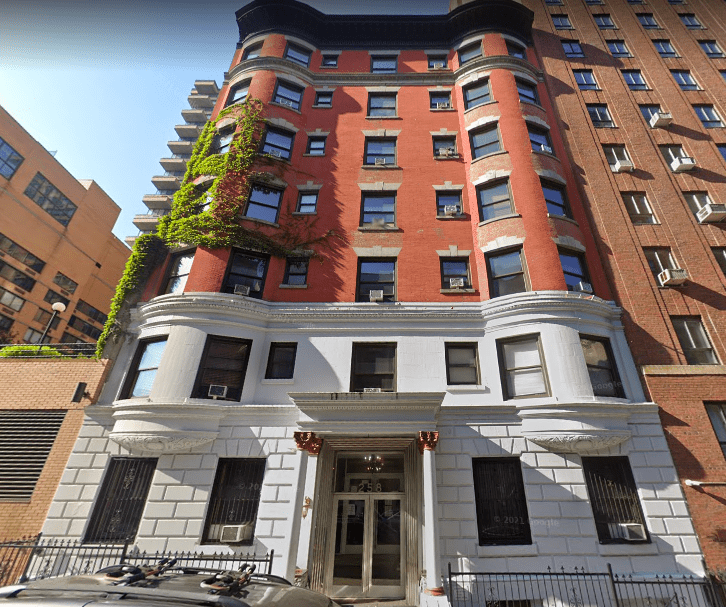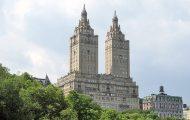
258 West 97th Street: The future home of Castle IV
At Community Board 7′s housing committee meeting on Monday evening, executives from The Fortune Society presented the non-profit’s plans to convert 258 West 97th Street into supportive housing for formerly incarcerated individuals as well as low-income residents. The project will be called Castle IV.
Following a brief presentation, some of which reiterated earlier statements, the execs fielded questions from board members and the public.
Advertisement
Presenters included President and CEO JoAnne Page, Deputy CEO Stanley Richards, and Vice President of Agency Operations Sherry Goldstein.
The Fortune Society plans to convert Hank Freid’s former illegal hotel, recently shut down by the mayor, into 83 SRO units. Here’s a breakdown of who will be living in them:
- 58 will house formerly homeless, formerly incarcerated individuals who “will undergo Fortune’s rigorous tenant screening process to ensure a safe building and community.” These individuals will pay 30% of their incomes towards rent.
- 15 of the units are currently occupied by rent-controlled, low-income tenants, all of whom “are invited to stay in the building” at their current rent levels.
- 9 of the units will be offered through the Housing Connect Lottery for individuals earning 60% of the area media income or less. These tenants will pay 30% of their incomes towards rent.
- 1 unit will be reserved for a building super.
Residents will have access to “on-site supportive services, including case management, group sessions, community building activities, and 24/7 security staff,” according to Fortune. There will also be a new kitchen and dining area and tenant accessible laundry, and plans are being made to improve the building’s backyard, finishes, fixtures and systems. The Fortune Society is also planning to install interior and exterior security cameras.
“Fortune provides formerly incarcerated people with wrap-around services, including education, employment services, housing assistance, substance abuse treatment, mental health treatment, family services, alternatives to incarceration, HIV/AIDS services, discharge planning, counseling, case management, and lifetime aftercare needed to break the cycle of crime and incarceration and to build productive lives in their communities,” read the opening slide in Fortune’s presentation. “All of Fortune’s programs are designed to meet the unique needs of this population through skilled, holistic, and culturally competent services.”
Advertisement
As we mentioned in our previous write-up about this project, several categories of individuals will be excluded from living at 258 West 97th Street. These include:
- Those convicted of arson.
- Sex offenders who are convicted of offenses requiring lifetime registry.
- Those convicted of methamphetamine production on any rental housing premise.
- Those assessed as posing a risk of current violence.
- Those assessed as inappropriate for the housing model and level of services provided.
Following the presentation was a question-and-answer session which lasted about an hour-and-a-half. We’re highlighting some of the more pressing questions from both board members and the public. Some of the following quotes have been edited and abridged for clarity. We’re also including videos which provide lengthier dialogues.
CB7 member Richard Robbins asked about existing data “showing whether there’s any impact in crime levels in neighborhoods where [The Fortune Society] already exist[s].”
JoAnne: “We work closely with the 30th Precinct in our West Harlem neighborhood, and we made a commitment to the neighborhood that it was going to be safer because of us, and the security cameras, the lighting all contributed to that. But when we first came to the neighborhood, people were scared and really worried about an increase in crime. By the time we were developing our empty lot, the neighborhood had turned to support us and the community board was supportive. When we came to the neighborhood there was an illegal parking lot that was our backyard and crack dealing was going on. We cleaned it out and we eliminated drug dealing; we basically made the neighborhood safer.”
Board member Catherine DeLazzero asked: “What can the community board do to be helpful in supporting your success and the success of the residence? What can Upper West Siders do to be good neighbors?”
Joanne Page: “I think you need to realize that our former homeless clients have [faced a] stigma most of their lives, and if you get to know them as human beings and invite them into your church, into your volunteer opportunities, they are eager to build new lives. We select people for that, and I think we are going to make this building transparent and we are going to include meeting space for the community to get to know them, welcome them, get to know them by name. Make them [feel] welcome, because they are not used to that.”
Advertisement
Board member Paul Fischer: “I live on 97th Street. My children went to school here and I have neighbors whose kids go to PS 163 and 75, and I’m wondering what sex offenders are accepted into your program?”
Joanne Page: “Level one … classified as low-risk. I’ll give you an example of one of the clients that we had; it was something that we refer to as a Romeo and Juliet affair because the guy was a couple of years older than the girl, the girl was under age, they had a relationship and the girl’s parents called the police on him. It was a statutory rape and this kid poses no risk whatsoever to the community. We will not accept people who pose a risk to the community.”
To clarify, there are three levels: Level 3 is the highest risk, Level 2 is medium risk, and Level 1 is low risk.
As described by New York’s Division of Criminal Justice Services, “the risk level is based on the court’s assessment regarding whether a particular offender is likely to repeat the same or similar registerable offense and the danger the offender poses to the community. Because the risk level reflects factors unique to a particular sex offender, offenders convicted of the same offense may receive different risk levels .”
For news across the park visit EastSideFeed.com
Board member Ira Mitchneck asked The Fortune Society whether 258 West 97th Street would have someone at the front door. The response was affirmative.
Advertisement
Board member Melissa Rosenberg asked how they would respond to residents causing any kind of disturbance by loitering, making noise, or smoking outside.
Stanley Richards said “that’s what RAs are for,” and Joanne Page essentially said this hasn’t been an issue at their other buildings.
Maria Danzilo — who ran for City Council District 6 in 2021 — brought up the lack of affordable housing in the neighborhood, particularly for seniors and the disabled, and prefaced her questions with, “I want to ask some questions about the process for how this happened” — wondering why the city’s settlement with the former building owner led to its acquisition by Fortune.
Joanne Page explained that they “basically bought the property on the open market through a broker. We didn’t become aware of the city’s suit until later in the process. The two were not connected, except that we basically needed the suit to be settled so that we did not have the property encumbered with the city sanctions based on the illegal use.” Page also noted that the contract of sale had a non-disclosure clause preventing The Fortune Society from talking about its acquisition publicly, and that they made it public as soon as they were contractually allowed to.
Advertisement
Kim Duncan, who said she represents many small businesses on Broadway in the 90s, raised concerns about the neighborhood’s existing issues: loitering, aggressive panhandling, shoplifting, and people who are mentally unstable. She noted that many of her clients tell her they “no longer want to walk down Broadway in the 90s,” and that she’s “quite surprised that this could happen when there are already two shelters around the corner.” She asked The Fortune Society how they deal with residents who get into trouble, and what kind of accountability protocols are in place. “We are very upset and we are very anxious about what’s coming.”
Joanne Page: “What I would suggest is that you consider our record in West Harlem.” In terms of accountability, she said that if one of their residents is causing a problem, “call us: we will address it.” Kim was not happy with this answer.
Ms. Williams asked if anyone with mental health and substance abuse issues is expected to reside at 258 West 97th Street.
Page said they won’t be taking those with severe mental illness, but they will house “a percentage of people who have substance abuse disorders and have mental illness.” In a follow up, Ms. Williams asked if an increased EMS presence should be expected due to these medical issues. Page said no.
To watch the full meeting, click here.




I’m old enough to remember the very bad down side of SROs on the UWS in the 70s. Unless there is very close supervision of residents — including mental health and addiction services — this isn’t going to go well.
The building was on the market for $18 million in 2019 (see WSR 2019) . Why did the city pay 71 million? Fishy
Senior contact me at rctfmills@gmail.com I will let you know why all this corruption is going on.
Read my story google Roderick Compass Real Deal